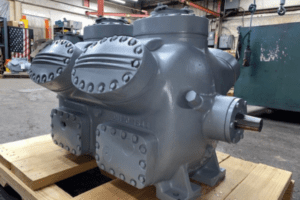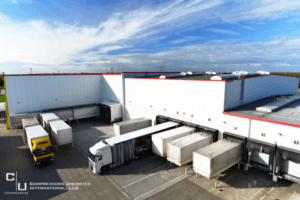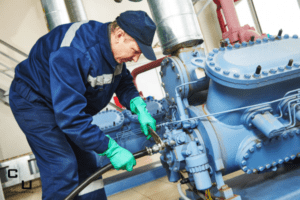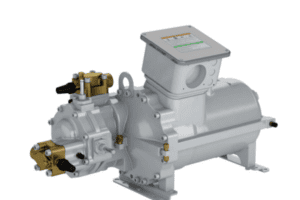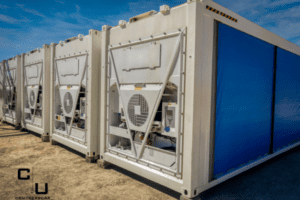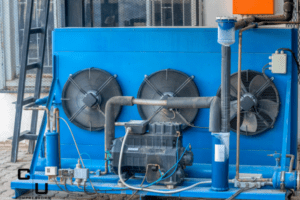Over the last few years, there’s been lots of interest in HVAC systems that do more than condition and distribute air. More companies are exploring innovative technology that can be used to keep indoor air cleaner. This has huge implications for the workforce, especially in offices.
Most facility managers have some familiarity with the dangers of Sick Building Syndrome. Once a total mystery, experts now suggest it comes down to indoor air quality in the workplace setting. People in the “sick building” experience genuine symptoms of illness that clear up shortly after they leave.
Naturally, that’s only one of many reasons why more proactive air filtering can be valuable. Some of the newest, most promising technology out there is being developed in the hopes that viruses and bacteria can be actively rooted out of the ventilation system using advanced filters or cleaning.
One of the biggest names in this new wave is bipolar ionization.
How does it work and do you need it? Let’s take a closer look.
What Is Bipolar Ionization and Why Is It Better than Standard Air Filtration?
Commercial HVACs can incorporate specialized filters, such as HEPA filters, or even use active filtration technology. For example, you’ve probably heard of ozone filtration. Bipolar ionization is another way to realize a more effective reduction of airborne pathogens than you would get in a standard HVAC.
Also called needlepoint bipolar ionization, this type of system works by generating both positively and negatively charged particles, usually in the form of oxygen ions. Manufacturers claim that the system oxidizes contaminants, which includes infectious pathogens as well as some natural irritants.
Bipolar ionization has been around in some form for about 15 years, but is being adopted in wider numbers today. This is because many more manufacturers have begun to make the claim that it’ll “neutralize” bacteria and viruses, such as the virus that leads to COVID-19 illness.
According to bipolar ionization companies, the positively and negatively charged ions emitted by the system cause floating particles in the air to naturally aggregate and fall out of circulation. This would significantly reduce the risks posed by airborne pathogens that might otherwise float for hours.
Does Bipolar Ionization Reduce Infectious Pathogens in Indoor Air?
Products are not allowed to make specific claims about “protection from COVID” without laboratory evidence. Throughout 2021, new legislation and Congressional action was necessary to halt a wave of unfounded and unscrupulous claims centering around “COVID-19 safety products.”
That being said, bipolar ionization technology continues to be used and new products continue to come out.
Laboratory studies are available that show bipolar ionization, like some other technologies, might be able to reduce the prevalence of certain pathogens that cause disease in humans – taking them out of circulation or even “inactivating” them. The key is having appropriate expectations for the product.
For instance, it is much easier to find products that have been shown to reduce the prevalence of E.coli and other common bacteria than one that deals directly with COVID-19. Not only that, but air filtration isn’t your only option: Sherwin-Williams Paint Shield is a highly proven microbicidal paint and is another tool that will help clean the air around you.
If You Go With Bipolar Ionization, Make Sure You Know What You’re Getting
The science behind bipolar ionization seems sound, but it’s still emerging.
To avoid complications, take care with your decision:
1. Carefully Evaluate Any Product Claims and Lab Reports
To comply with federal law, products must be very specific about the type of pathogens or pollutants that could be affected by their technology. There should also be laboratory reports you can review to see the facts behind these claims. Marketing language cannot make false claims, but it can make the truth harder to figure out. Check out the reviews and testimonials attached to any product.
2. Get Information Direct from the Manufacturer
Naturally, any manufacturer will want you to make a purchase. Still, you get a much better sense of where they are coming from by contacting them directly. The manufacturer should be easy to reach. Expect representatives to have full and meaningful answers to all your questions. Not satisfied by the answers? It might be best to pass on this opportunity.
3. Consult a Compressor Remanufacturing Company
A commercial compressor remanufacturing team can help you know in advance how a bipolar ionization system, or any other specialized commercial HVAC system accessory, might affect your compressor. Don’t risk losing overall system performance – get personalized advice before you make your decision.
At Compresors Unlimited, we do not sell bipolor ionization systems, but we have the knowledge and experience to inform you of what is good or bad for the compressor side of your commercial HVAC system.


